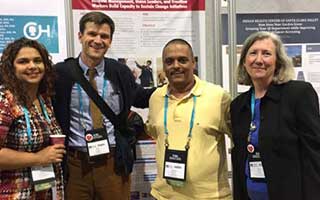Staff from the Labor Management Project (LMP), Bronx-Lebanon Hospital Center (BHLC) and Mount Sinai Queens (MSQ) were part of the poster session at the 2016 Institute for Healthcare Improvement’s (IHI) National Forum on Quality Improvement in Healthcare, December 4-7. More than simply a chance to network, the forum provides nearly 6,000 healthcare professionals with opportunities to gain actionable ideas for their organizations and help effect real change in healthcare quality and safety.
Mount Sinai Queens/1199SEIU Healthcare Workers East
MSQ’s storyboard featured labor-management work, supported by the LMP, that aimed to build leadership capacity and capabilities at all levels and titles while spreading a performance improvement culture. To achieve this goal, MSQ and 1199SEIU Healthcare Workers East formed a Leadership Development Committee in Imaging Services, consisting of management and frontline staff, to guide multiple performance improvement teams. Since April 2015, the teams generated more than 30 initiatives and strategies for improvement, including a communication plan and a virtual discussion board to improve patient safety and satisfaction and team engagement/effectiveness.
These interventions have resulted in significant improvements, including a reduction of first case cancelations and/or delays from 38% to 9.5% for MRI patients and a reduction in transport delays, with those lasting more than 10 minutes dropping from 72% to 22% of the total.
Bronx-Lebanon Hospital Center
Bronx-Lebanon Hospital Center’s storyboard featured an initiative to build sustainability for change and patient-centered care through developing the leadership skills of frontline workers. BHLC embarked on a patient-centered care (PCC) initiative that included staff training, train-the-trainer sessions, and jointly-led performance improvement initiatives in three clinics. Leadership development and performance improvement capacity-building was provided to jointly-led labor-management teams. The PCC training was used as a foundation to engage and develop frontline workers as leaders empowered to implement and sustain those and other changes.
The initiative, which was supported by the LMP, 1199SEIU, the Committee of Interns and Residents, and BLHC leadership, succeeded in the following ways:
- Trained trainers delivered PCC training to over 700 colleagues;
- Pre- and post-clinic assessments showed 6-month improvement in communication, role clarity, performance measurement, and recognition;
- Surveyed staff reported improved team effectiveness, including more ability to resolve conflict and solve problems, better communication, and better relationships both among staff and between staff and patients, and
- Collaboration between labor and management improved, as evidenced by improvements in the quality of teamwork by teams composed of union members and management representatives.
